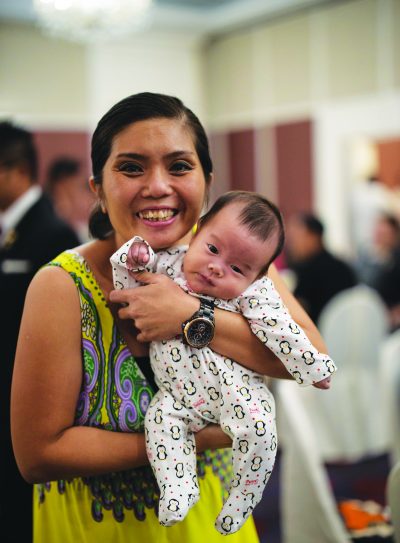Juggling a career and family can be tough, especially for newly-christened working mums. But young Malaysian parents, caring employers and extended families are joining forces to create success stories.
It’s meant to be such a special time in your life, when you and your partner decide to welcome a baby into the world, and embark on the journey of becoming a family together. However, the trip is often littered with discussions (sometimes arguments!) and life-changing decisions about careers, living arrangements and budgets.
Working women, in particular, have to weigh the consequences of having a baby against forging ahead in their careers. Pregnancies often force families into traditional gender roles where the husband concentrates more on paid work and the wife sacrifices her career to look after the children at home, ultimately putting women at a disadvantage when it comes to gender equality in the workplace.
Progressive parental leave policies, such as those in Scandinavian countries like Finland, Germany and Iceland, can make the transition to parenthood more equitable, splitting the responsibilities between both parents regardless of gender. However, in Malaysia, women still bear the bulk of the burden of caring for the family, more so because the law was designed that way six decades ago and has yet to go through major reforms.
Under Maternity Protection Eligibility in the Employment Act 1955 in Malaysia, mums are eligible to 60 consecutive days of maternity leave, and each female employee is entitled to paid maternity leave for up to five children. Meanwhile, fathers in the private sector are not legally entitled to any paternity leave, while fathers in the public sector get seven days of paid paternity leave. The Human Resources Ministry earlier this year proposed amendments to the Employment Act suggesting the inclusion of three days of paid paternity leave for those in the private sector.
In June, The Star Online reported that Malaysia’s female labour force participation was only at 55.6% – one of the lowest in South-East Asia – compared to 80.7% for that of men, as of 2018.
What’s more is that many women feel unsupported when they eventually try to return to the workforce after their maternity leave expires. There usually isn’t any formal structure of support for these women who have to adjust to their new role as “working mums”. The onus is almost always on the mother to adjust her baby’s feeding and sleeping schedules, and to figure out how to get to work and home on time (cook, clean and ferry the other children to school/daycare), as well as how they will continue breastfeeding (where and when to pump breast milk, how to store it) all while keeping up with their peers at work! That’s no small feat! Those who are self-employed are not spared from these challenges.

Ooi See Bee from Kuching, Sarawak, who runs an ice-cream food truck, says that breastfeeding was challenging once she resumed working after her confinement.
The mother of two says: “The challenge was making time to nurse my baby. My job required me to work outdoors, hence looking for a place to express milk was really hard and storing it was an added challenge! Most times, I would do it in the car with all shades up and I carried my ice bag around with me.”
Breast milk supply has been known to drop when one returns to the workforce, probably because the work environment is not as conducive as home.

Twenty years ago, many offices did not have a nursing station, so women were forced to sit in bathrooms or storerooms when they needed to express their milk. Pumping was also considered disruptive to work routines and would eat into one’s lunch or break times, and not put you in the best light with your co-workers and bosses! However, things are changing for the better, and many young women find their peers and management growing in their acceptance of working mothers’ need for flexible working hours, cutting them some slack.

Journalist Nasa Maria Entaban from Petaling Jaya shares that her bosses were completely supportive of her new role in life as a mother.
“No one ever gave me grief about taking time off to take my kids for their vaccinations or to be with them when they were ill, and I was rarely assigned events after hours until my (first) child was older and we hired a live-in helper,” says the 37-year-old who has two daughters, a six-year-old and an eight-month-old baby.

Nasa’s workplace at Menara Star has a nursing mothers’ room where mothers are able to comfortably pump in private and store milk in a safe and clean environment, and are allowed time to pump as many times a day as they need to.
Nasa adds, however, that her challenge was (and still is) figuring out when she can commit more time to build her career and take on more responsibility. She says: “Even with my hours being forgiving and having my weekends off, I still feel like I am stretched thin with trying to juggle raising children and thinking about my career, let alone my spousal duties!”
So, can employers do more to level the playing field for working moms, and new mothers in particular? Nasa feels that there should be more understanding of the importance of a father’s role in caring for children.
“Don’t perpetuate the stereotype that parenting is 90% a woman’s job. Give dads the chance to take their kids to the doctor and so on. If most of the parenting continues to be left to the mother, women will continue to be left behind in the workforce.
“For new mums, set up a daycare centre in the same building so that mothers can return to work, assured that their baby is just a floor or two away. More importantly if they are breastfeeding this will enable them to maintain their supply which often drops when breastfeeding mothers return to full time work. Or, offer subsidies for daycare centres near the workplace (some multinationals in KL offer this already). For working mums, make working from home an option. Don’t punish parents for wanting to raise the next generation of adults.”
Indeed, even at companies that offer formal flexible work policies for mothers, employees are often too afraid to take advantage of the benefit for fear they may be earmarked as “unambitious” or “distracted” and placed in less-demanding, lower-paying positions. Meanwhile, those who decide to take a longer break from work may find it just as disconcerting. Letting go of a career, even temporarily, can create anxiety and many new mums feel a little bit lost with the sudden displacement of their careers.
However, if you have a sound foundation with your partner and decide from the get go how connected you want to be with your family, as well as your career, then you can set your priorities ahead of time, and you might be able to advance successfully as both mother and career woman.

Siti Hajar Abdul Rahman, 39, from Petaling Jaya, was working in Corporate Communications when she gave birth to her son, who is now four.
“Initially I took maternity leave but eventually I had to resign as I felt three months was not enough for me to be with my son and I wanted to breastfeed for the first six months. I was also not prepared to let someone else care for him. I ended up staying at home for six months before going back to work as a consultant, and this allowed me to work two days a week with flexible hours,” Hajar shares.
“Six months was good for me. Enough time not only to get into a good routine but it gave me time and the ability to breastfeed exclusively. It was also long enough that by the time I did decide to go back to work, I couldn’t wait! My husband played a really important role in the initial months and even to this day. After I had my son, I actually suffered severe pelvic pains. I had to go for physiotherapy every other day for three months before I was healed. During that time, my husband’s presence helped tremendously to offload some of the burden of caring for a newborn while I underwent recovery.”
For in depth interviews with these mums, go to Working Women: Mums and Maternity Leave







Comments